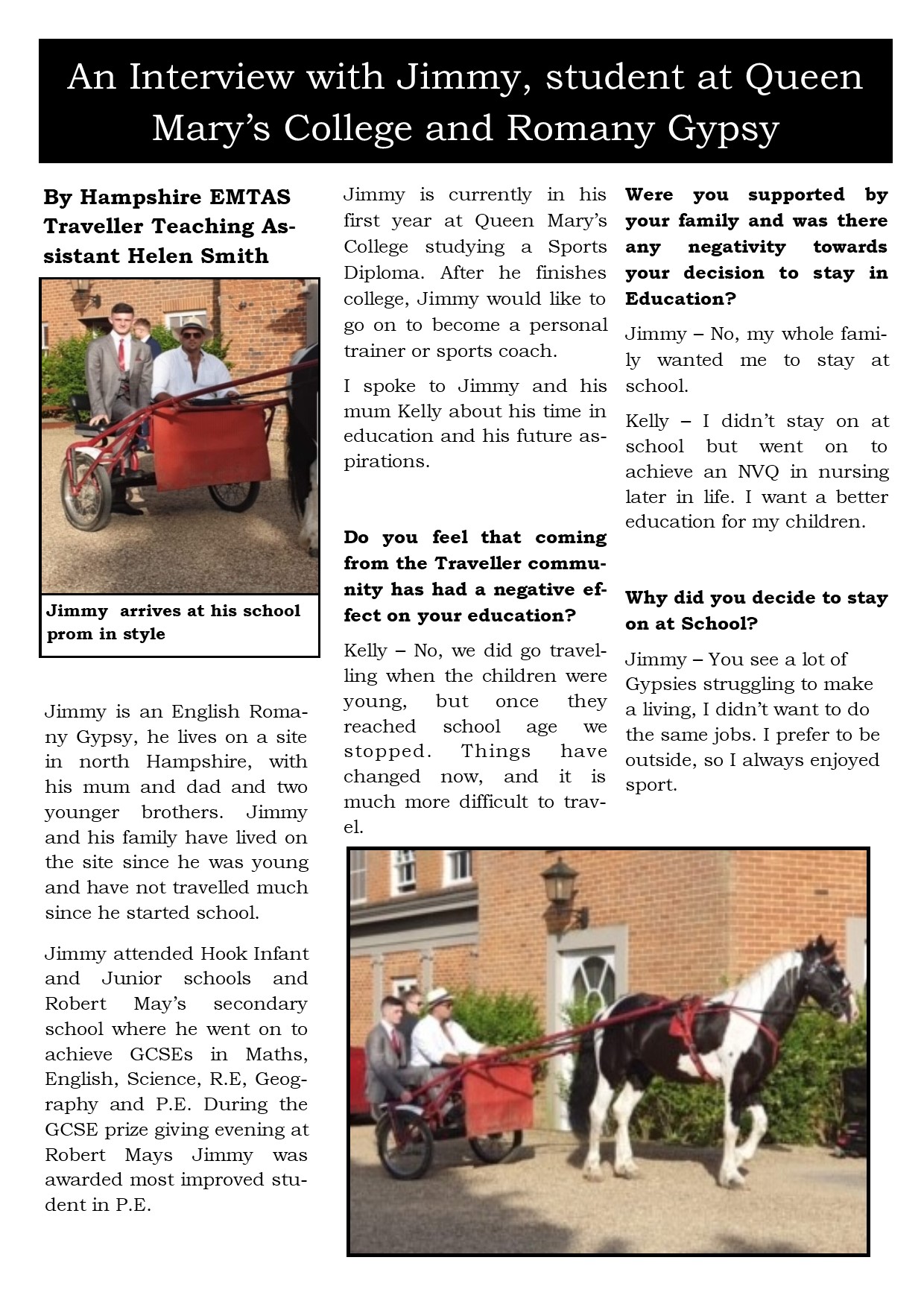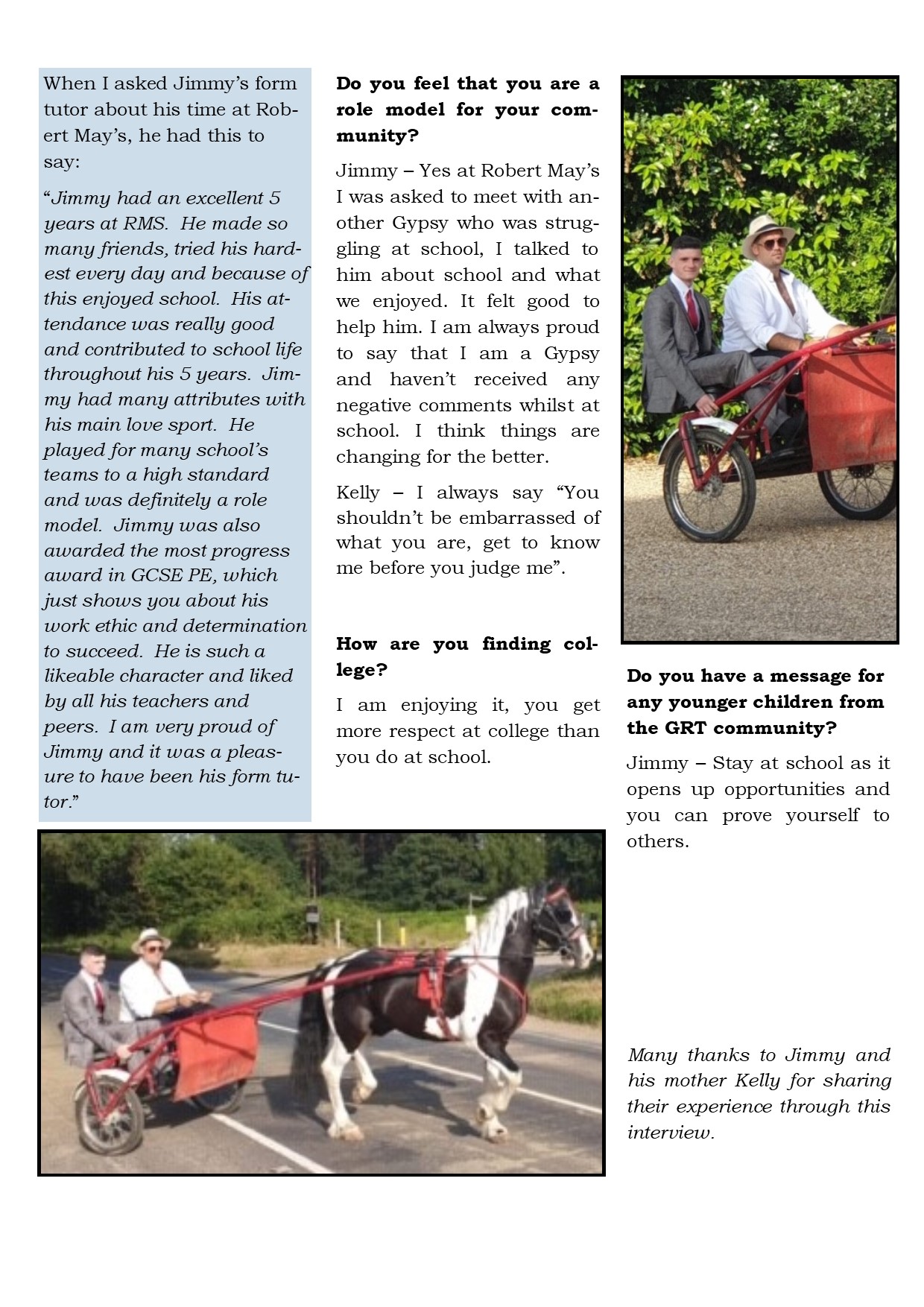Site blog
By the Hampshire EMTAS Traveller Team
Due to current circumstances and the impact on schools of the lockdown, we have decided it would be a good idea to move our celebration of Gypsy, Roma, Traveller History Month (GRTHM) from its traditional month of June to October so no one will miss out on our planned events.
To this end, we are putting on three roadshows across the county. The roadshows will be in Basingstoke, Winchester and the New Forest and there will be something for everyone from talks to exhibitions to Stepping with FolkActive. The roadshows promise to be lively, entertaining and informative and will give our audiences a chance to see how Hampshire EMTAS works with its schools and GRT communities.
The roadshows are drop-in events with talks taking place between 4pm and 5pm after which people will be invited to take part in a stepping activity. Stepping is a traditional form of dance that was initially a type of sport for working class men in the north of England and for Travellers. Each dance is created by the individual dancer and does not follow any set rules – it is energetic and is often described as tapping or drumming with your feet. It requires no previous experience or expertise and when the live music is playing, it is impossible not to move your feet. Come along and join in.
There will also be an exhibition of the Life of Showmen displaying the rich history of Showmen in Hampshire through the decades and a display of all the entries to the a postcard competition (details below).
These promise to be lively events with lots of interaction, music and dance so save the date! The EMTAS Gypsy Roma Traveller History Month Roadshows will take place on:
1st October: The Discovery Centre, Winchester, 3.30 – 6.00pm
8th October: The Discovery Centre, Basingstoke, 3.30 – 6.00pm
22nd October: Applemore College, Hythe, 3.30 – 6.00pm
We hope lots of you will be able to attend a roadshow near you. We will soon be sending out a Schools Comm with further details and we’ll be advertising the roadshows on our website as well as issuing personal invitations to all the schools, families and agencies we work with. We look forward to welcoming you to one of these events and to getting to know you while you enjoy the exhibitions, talks and dancing. We hope to see you there!
The EMTAS GRTHM
postcard competition
As part of our GRTHM celebrations, we are also holding a postcard competition. It’s open to all GRT children and there are three categories: KS1, KS2 and KS3/4. We are launching the competition in June and need lots of support from our schools to make this a big success. The winning postcards are going to be printed and, in liaison with schools, sent to GRT children all over Hampshire in recognition for their improved attendance and/or attainment throughout the year. The winners in each category will also receive a prize and both winners and runners-up will see their postcards included in a full-colour calendar, something they can share with their families and feel really proud of. We will be in touch about the competition and how you can support your GRT children to take part in it very soon.
Meet the Hampshire EMTAS Traveller Team
The EMTAS Traveller Team consists of
Strategic Lead:
Sarah Coles (EMTAS Deputy Team Leader)
Operational Lead:
Claire Barker (Specialist Teacher Advisor)
EMTAS GRT Officer:
Sam Wilson (Attendance, Admissions and Transport)
Traveller Teaching Assistants:
Julie Curtis with responsibility for ELSA
Steve Clark
Our work always has an education focus and comprises working in partnership with schools to support Traveller children and families. At this time of year, we are heavily involved in transition work, supporting the move from infant to junior school for younger GRT children and from Year 6 to Year 7 for older ones. New for 2019-20 is our GRT Excellence Award, a self-evaluation framework that can support schools to develop and embed best practice in relation to their work with GRT communities. Also popular is our new GRT Reading Ambassador Scheme which is having a positive impact on children’s progress in reading in the pilot schools where it has been running. We can also support with attendance, admissions and transport applications and we can provide cultural awareness training to school staff.
Visit the Hampshire EMTAS website
Read our GRT blogs
Subscribe to our Blog Digest (select EMTAS)
By the Hampshire EMTAS Traveller Team

The objective of this article is to talk about Distance Learning for Traveller pupils and how to produce quality resources for your pupils who would normally be off travelling from April until November. However this year every teacher across the country, if not the world, has been producing good quality distance learning packs not for the few but for all their learners. This is a bonus for us as a service because it means teachers will all now know how to create Distance Learning materials. Alas this time will pass and fade from memory so to help support the creation of Distance Learning packs for GRT children in the future we have produced this easy to follow guide.
Learning at home
Home learning can cause many worries and concerns for Traveller families. The living conditions of many of the families are not conducive to learning. If a Traveller family comprises more than one child of school age all wanting to do written work or work on a tablet, computer etc. and the family live in a trailer, space can be an issue. Many Traveller families have difficulty with internet access depending on their living conditions as many sites do not have broadband or internet connectivity. The families may say they have internet because they have 3G or 4G on their phones but they don't have the ability to download and do work in a meaningful, straightforward way. It is therefore very important to offer the work in a paper format that can be collected safely from the school.
Some parents, not exclusively Traveller parents, have trouble with literacy and this can create a barrier to them being able to support their child’s learning. Some Traveller parents may not have attended school at all or may have had a shortened school experience or erratic school attendance. These factors can lead to them having poorly-developed literacy skills that prevent them from being able to act as parent teachers in the home following a school based curriculum. Some Traveller parents may say no to the packs telling schools they are managing fine. This can be borne out of fear of not being able to meet the school’s expectations. It helps to talk through with the parent what they are doing with the child at home and to look for learning opportunities in what they are comfortable with. This can be as simple as when they are out for a walk counting the cars or finding flowers and saying what letter they begin with. The children can collect stones and write letters or numbers on them to help them practise counting and letter-sounds.
Most Traveller families follow the rule of Mochadi. This is a cleanliness code that is strictly adhered to in the dwelling place whether it is a house, trailer or chalet. This code does not allow messy play with pens, pencils, glitter, glue, play dough, etc. inside so it is good to look for activities the children can do outside like scavenger hunts, making bug dens, making bee hotels. Many of the Traveller children will be getting educated in their culture during lockdown. Many will be given responsibilities around the home and work with the father. Often the children have animals to look after and girls will be taught cooking and homecraft.
Hampshire Ethnic Minority and Traveller Achievement Service (EMTAS) have created a Distance Learning page to signpost available free resources that may be useful. The EMTAS page is constantly growing and we would love to hear from you if you have made or found a brilliant resource that we can add - and we'll credit to you for submitting it.
The Traveller Times have also created a page of resources that may appeal to some of your Traveller learners and their families.
Fears and coding absences
Many Traveller families had great fears of
Covid 19 before the government issued guidelines for schools and this resulted
in many families removing their children from education either as an extended
absence or to electively home educate them. Some Traveller families did go travelling and asked the school to use
the ‘T’ code as they would be working as they travelled. The ‘T’ code can only be used for very
specific circumstances and travelling to avoid Covid 19 would not be a legitimate reason
to use the code. This link explains
how to use the ‘T’ code accurately.
The absence coding of Traveller children who went off school before the government closure is at the discretion of the Headteacher who may wish to seek advice from their local EMTAS or Inclusion service.
The Traveller Times team recognised early
on that many of their members and families had a great fear of this illness and
they produced a simple factual video made by Lisa Smith, a Traveller and one of
the editors of the Traveller Times, to help allay the fears of Traveller communities.
Challenges ahead
Once this is over and schools go back to some semblance of normality, the challenge of getting Traveller children to return will begin. Many families have fought battles with elders to have their children in education and now these battles will begin again. Many Traveller children who are due to transition to junior, secondary or further education may find the emotional stress and worry too much and opt instead for elective home education and work. It is vitally important to keep in contact with the Traveller parents of children in Years 2, 6 and 11 to reassure them and offer transition support. Schools should contact their local EMTAS for help and guidance with this.
Life will return to normal and our Traveller children will slowly come back into education and challenge us with their learning and sometimes their behaviour but all credit to you, when they come back through your doors – this demonstrates education is valued by our Traveller communities and that they trust you with their child; there is no greater reward than this.
Visit the Hampshire EMTAS website
Subscribe to our Blog
Digest (select EMTAS)
By Hampshire EMTAS Traveller Teaching Assistant Helen Smith
During the summer and autumn terms the EMTAS Traveller Team is always busy supporting pupils through the transition period. Historically, transition was focused on the transition from Year 6 to Year 7 and although this still remains the bulk of our work, we have now developed programmes to support Gypsy, Roma and Traveller (GRT) pupils from Year 2 – Year 3 (when a child is moving from an Infant school to a Juniors) and into Year R.
The period between Year 6 and Year 7 is the time when high numbers of GRT pupils are withdrawn to be Electively Home Educated (EHE); on average we lose about 30% of our pupils to EHE during this time. We are working hard with pupils, families and schools to reduce this number. During the spring term we meet to review the data and identify pupils that may be at risk of not successfully transferring to secondary school. There is a variety of identifiers for such pupils, which include:
no application for a secondary place made
low or erratic attendance
older siblings that are already EHE
children whom we have previously supported who we know have reservations about secondary school
SEND issues.
We then begin transition work by contacting schools that have pupils on roll who have not made secondary applications and we offer our help. We may ask school to chase up the application and find out from parents if they need help or we may meet with school and the family to talk through any issues and barriers. Our position on school applications is always to make the application, even if you are not sure your child will be staying in school, then give it a go even if it’s just for a term.
Our transition programme is for GRT children who have secured a secondary place. It takes place during the summer term and can be delivered over a period of between 2 and 4 weeks. It includes a follow up visit in the child’s new school in the autumn term. The aim of the programme is to encourage the children to want to start thinking more positively about secondary school and the opportunities it can give them. The programme focuses on post-16 aspirations, necessary school equipment, timetables and routines and any worries, questions and concerns. The follow up can sometimes just be a phone call to the school to check that the child has transitioned and make sure there aren’t any problems. Ideally this would then be followed by a visit to talk to the child and help with any issues they may raise.
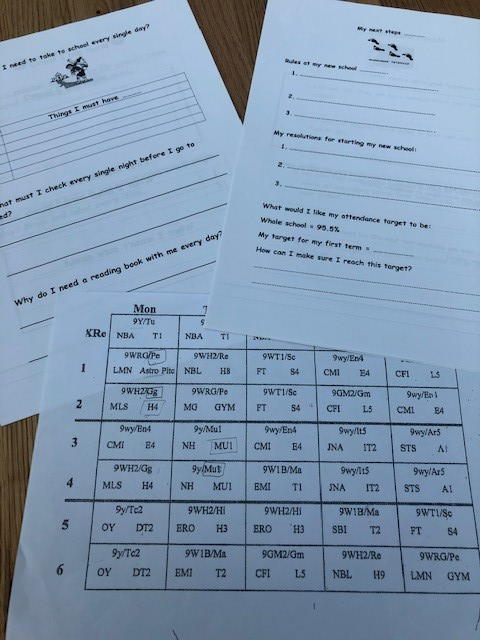
Last year we piloted a programme to help transition from Year 2 to Year 3 where children are transferring from an infant school to a junior school, i.e. it is not aimed at children who are attending a primary school. Due to time restraints, we target this offer at children who we think may struggle to settle into their new junior school. This can be because:
they have already attended several schools
they have only recently settled into their current infant school
there are SEND issues
they are an anxious child or parent
they have low or erratic attendance.
The Year 2 – Year 3 programme comprises three sessions in the infant school and two sessions in the junior school. The programme centres around similarities and differences between the two schools and is aimed at reassuring the child about any worries they may have about their new setting.
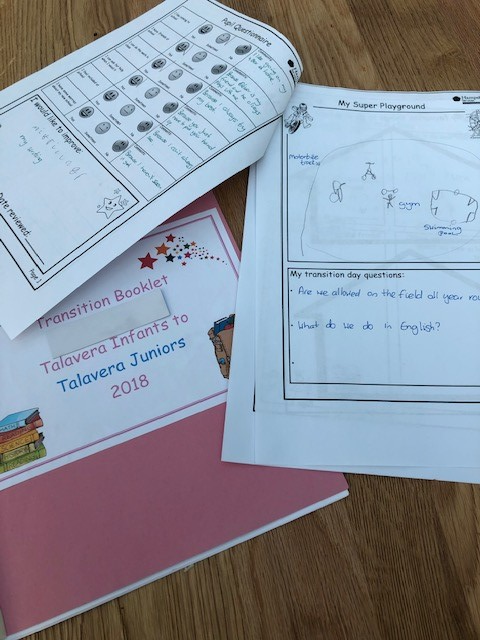
In 2018-19, we piloted a transition programme for children transferring from pre-school to Year R, or into Year R having not attended a pre-school. Again, these will be children who have been identified by us, the school, pre-school or parent as needing extra help to settle into school. This may be because:
the child has not attended any pre-school setting
the parent is anxious about the child starting school
the attendance of siblings has been erratic or low
there are SEND issues
extra support has been recommended by an outside agency.
The bulk of the programme takes place once the child arrives in the infant school, but ideally begins with a meeting with school/pre-school and parent in the summer term to discuss any issues and help with ideas for making sure the child is school ready. The programme involves one of the EMTAS GRT persona dolls. The doll and I visit the school during the first couple of weeks. The children show us around their school and share some of their school activities and routines. Our visits are recorded in the doll’s journal using photos and the children’s work. The persona doll and I will then visit again in the spring and summer terms and check on the child’s progress.
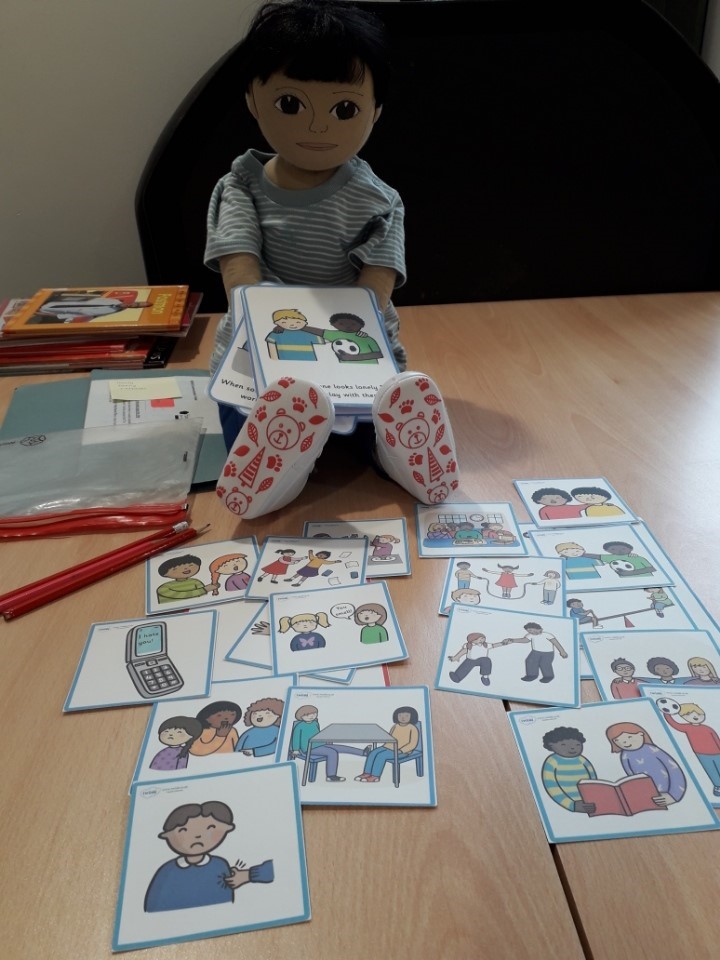
The aim of the transition is to make the experience as positive as possible to help aid retention in all phases, especially secondary. As a team, we believe the better the experience our GRT children have early in life, the more positive an influence this can have on their attitude to school and education, which can pay dividends in the secondary phase. The majority of Year 6 GRT pupils with whom we have worked over the last 4 years are still in school and about to enter their GCSE year. This is testimony to the dedication, flexibility and perseverance of our team, the GRT children, their families and in no small part the schools.
If you have a GRT pupil that you think would benefit from EMTAS
transition support, please use the website to make a referral in the normal way, ideally by the beginning of the Summer term.
Additional information pertaining to GRT support and staff training can also be
found on our website.
Meet Helen Smith and persona doll Jesse at the next Basingstoke network meeting on March 23rd at Marnel Infant School. Booking essential. Further details on our website's training tab.
Visit the Hampshire EMTAS website
Subscribe to our Blog Digest (select EMTAS)
Dawn Walters, Year R Team Leader at Hook Infant School, shares the exciting activities she planned as part of a Romany Gypsy Day she organised for her class.
Visit the Gypsy, Roma and Traveller (GRT) pages on the Hampshire EMTAS website.
Subscribe to the Blog Digest (select EMTAS).
In their last blog article published in the summer term, the Hampshire EMTAS team concluded the academic year with a celebration of their schools’ successful completion of the EAL Excellence Award. Now feeling refreshed after the summer break, the team look forward to the year ahead.
EAL Excellence Award
Our work supporting schools to develop and embed best practice for their EAL learners through the EAL Excellence Award continues. Surgeries will be held to help colleagues get ready for Bronze level and many of this year’s network meetings will focus on aspects of the award which practitioners need to develop for the next level up. For example, many schools will want to work on planning for the use of first language as a tool for learning this year (more on this in a future blog). See the EMTAS website for more information about the Award and how you can introduce it in your school or setting.
GRT Excellence Award
Following the success of the EAL Excellence Award, we have developed a similar award to support schools who have Gypsy, Roma and/or Traveller pupils on roll. At present, we have eight schools piloting the GRT Excellence Award and working towards getting their accreditation. To find out more, please contact: claire.barker@hants.gov.uk
NALDIC Berkshire & Hampshire Regional Interest Group (RIG)
NALDIC is the National Association for Language Development in the Curriculum and has an EAL remit. Part of the work of NALDIC is to run Regional Interest Groups (RIGs) across the country. Many of you may have heard that Dr Naomi Flynn is giving up her role as convenor of the Berkshire and Hampshire RIG. Whilst we are sad as this means we will see less of Naomi, we are also excited that the responsibility will now be shared between Portsmouth EMAS, Dr Anna Tsakalaki at the University of Reading and ourselves at Hampshire EMTAS! We wish Naomi all the best in her new role of Events Chair for NALDIC and look forward to working with our new co-convenors.
Network meetings
EMTAS network meetings are a great opportunity to meet colleagues with an interest in EAL practice and provision, to share ideas and to access input and take part in discussions on a range of EAL-related issues. These termly meetings are free to Hampshire maintained schools; staff from academies or the independent sector are also welcome to attend for a small charge. To find dates and information about how to register for a network meeting near you, see the Training section of the EMTAS website.
EAL E-learning
Our EAL E-learning has been given a complete overhaul this year to bring it up to date. The modules will now play even better in the Chrome browser and are optimised for seamless delivery over mobile devices. Check out our latest module on the ‘Role of the EAL coordinator’ and look out for new modules being developed this year.
SEAL (Supporting English as an Additional Language)
Due to popular demand, this course is running again starting in October 2019. It is a training programme for support staff and EAL co-ordinators to help them build up their knowledge of EAL good practice and pedagogy and has a strong focus on practical strategies to support pupils with EAL within their school environment. The course covers best practice in the classroom, SEND or EAL?, assessment, working with parents of children with EAL and the latest digital technology and resources to support learning in the classroom. If you are interested in signing up for this course, please check details on our website.
NALDIC Conference
This year the NALDIC conference takes place at King’s College London on 16th November (easy walking access from Waterloo station). The conference title this year is ‘Inclusive practices in multilingual classrooms: assessing and supporting EAL and SEND learners in the mainstream’. The NALDIC conference always has a good variety of workshops to suit all tastes, stands from publishers/resource providers and is a great place to network with colleagues from all over the country.
As you can see there are plenty of opportunities to get involved with EAL this year. We look forward to seeing you at an event near you.
By Hampshire EMTAS Specialist Teacher Advisor Claire Barker

As the summer fast approaches many of us will see our Traveller children and their families disappear for the last weeks of term or dot in and out as they attend the most notable horse fairs around the country. The horse fairs are a valuable and treasured part of the Traveller culture and should be shared and enjoyed in our schools that have Travellers as part of their school community.
The season always opens and closes with Stow Fair which is held in May and October. It takes place at Maugersbury Park and thousands of Travellers come to the showground to trade and parade their horses. This particular fair has been an annual event since 1476 when a Royal Charter was given for a fair to be held.
Locally, in Hampshire, Wickham Fair is always held on 20th May unless that day falls on a Sunday and then the fair will be on 21st May. This year it is an extra special event as this is its 750th anniversary. King Henry III granted a Royal Charter to Wickham in 1269 to hold the fair and markets in the town. It was not a Gypsy Horse Fair at this time but in later centuries it became one of the main English horse fairs for Travellers. A condition of the Charter was that a fair had to be held every year on that day so during World War II a local Traveller placed a carousel in the Square to keep the tradition of the fair going so it could continue after the war.
Appleby Fair is the
big event of the year for Travellers and it happens in the first week in June
and goes on from Thursday to Wednesday with the main events happening on the
Friday, Saturday and Sunday. Like Wickham
and Stow fairs it was also granted a Royal Charter. King James II granted a charter to Appleby in
1685. Many Romany historians claim this
fair is older than five hundred years with some claiming Travellers from the
Roman times travelled to Appleby to trade and parade.
The fairs and the
events surrounding them form a vital heartbeat in the Traveller
communities. It is a time when
Travellers from Ireland, Scotland, Wales and England come together to share
their traditions and values. They trade
together buying and selling horses and goods.
They eat together and socialise and there is lots of catching up with
families from far and wide. The fairs
are often times for family weddings, baptisms and birthday celebrations as the
whole family is together. Many young
Travellers meet their future partners at the fairs.
Romany, Irish Travellers, Scottish Travellers, Welsh Travellers and Showmen come together to ply their goods and catch up on the year’s events. However, the Showmen tend to be at the fairs as service providers running carnivals and catering wagons for all of the Travellers.
Many of the families will take pictures and share them on social media and this provides schools the opportunity to discuss and find out about the fairs and the Gypsy, Roma and Traveller communities.
If you have a child from a Traveller community in your school and they are absent for a fair, take the time on their return to ask them to share the magic and experiences they have had. Explore their world together and create a greater understanding of one of Britain’s oldest communities and what they hold dear.
Visit the GRT pages on our website
EMTAS Education Advisor Sue Nash discusses how the T code should be used by schools when their Traveller pupils are absent due to their parents travelling for work purposes and how schools can support their Traveller pupils through the provision of distance learning work.
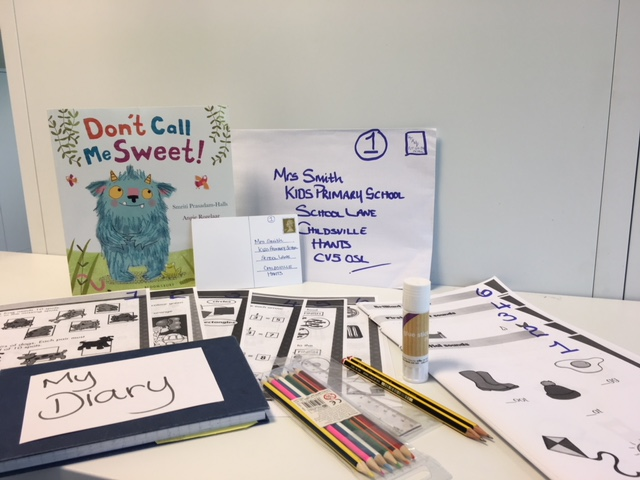
© Copyright Hampshire EMTAS 2018
Hampshire EMTAS regularly receives enquiries from schools about the T code and when or how it should be used. From the nature of these enquiries it has become clear that there is confusion over exactly when the T code should be used. This blog seeks to clarify its use and to give examples of good practice around supporting Traveller pupils whilst they are away from school.
What are attendance codes?
There is a statutory national system which schools must use to record pupil absence. This comprises a number of single letter codes which are used in registers. The use of these codes enables schools to record and monitor attendance and absence in a consistent way which complies with the regulations. Hampshire schools must follow the regulations and therefore when pupils are absent the school needs to decide which absence code to use. It is important that this information is factually correct as unauthorised absences can result in a penalty notice being issued.
What is the T code?
The T code is one of the statutory codes. It should be used when a child fulfils all of the following:
is ascribed as Gypsy, Roma, Traveller (GRT) or a Showman (children of circus and fairground families)
has attended more than 200 sessions of school in any rolling 12 month period if the child is over the age of 6
the child’s family has requested leave of absence to travel for economic purposes i.e. work (DfE, 2016).
If all of the above criteria are not met the T code should not be used. Crucially, the school needs to have evidence that the family’s reason for travelling is to earn a livelihood. This is typically seasonal for fairs, horse fairs, festivals and circus events. If the family are travelling for other reasons such as attending a wedding or other social events then the T code must not be used.
What about Traveller children whose families do not travel?
The T code should never be used for these children as they do not meet all of the criteria above. These children should be expected to attend school regularly in the same way as any other pupil.
Can the T code be used for Traveller children who live in houses?
Yes, a GRT family that lives in a house but travels in the course of their trade or business can have their children’s absence from school recorded with the T code.
What about children who attend a different school when they are away travelling?
It is good practice for children from GRT and Showmen families to attend school in the location where their parents are working if possible. In these circumstances the child should be dual registered both at that school and their main school. The D code should be used in the register of the child’s main school when they are absent due to attendance at another school at which they are also registered.
Research into the use of the T code in Hampshire
As a result of the volume of enquiries that EMTAS were receiving about the use of the T code a year long project looking into the use of the T code in two groups of Hampshire schools was conducted by myself and Lisa Kalim, Specialist Teacher Advisor. The full report can be found on the EMTAS website.
Findings revealed a general lack of clarity around the appropriate use of the T code. In particular there was a lack of understanding that the GRT family had to be travelling for work purposes in order for the T code to be used. For example it was found that the T code had been used for children who had been absent due to a family dispute, for children who were missing in education or who were moving to a new school. The project also revealed the T code had been used for whole classes of children gone on a school trip as the T had mistakenly been thought to stand for ‘trip’.
How can schools support pupils who go travelling for work purposes?
Schools should provide distance learning work when their GRT pupils are away travelling. Currently lots of schools report not offering any distance learning work at all. EMTAS currently promotes this by showing sample packs of distance learning work suitable for different age groups from Year R to Year 11. The sample packs include practical items such as stationery that the pupil will need together with stamped addressed envelopes for them to return their work via the post as well as examples of activities. Alternatively, schools could use email to send and return work electronically or another approach could be to use resources such as a talking photo album in which pupils could record their work. Skype calls or Facetime could also be used so pupils can keep in touch with their base school.
Where to get help
Hampshire EMTAS runs a Traveller phone line every Monday during term-time between 11am and 1pm. If a school has any questions about the T code or distance learning then they can call 01256 330195 and speak to a Traveller Education Advisor.
References
DfE (2016): School attendance Guidance for maintained schools, academies, independent schools and local authorities. London: HMSO.
Nash, S. & Kalim, L. (March 2017) A study into the use of the T code by two groups of schools in Hampshire focusing on the accuracy of its use, the notice given by parents to schools about their travelling plans and if schools are setting distance learning work appropriately [online] http://documents.hants.gov.uk/education/EMTASstudyintotheuseoftheTcodeMarch2017.pdf (accessed 03.05.2018)
Also see
Hampshire County Council (May 2014) ‘Section 6: effective practice document for school attendance procedures and admissions for Gypsy, Roma and Traveller children’ in: Promoting pupil attendance and recording absence [online]
http://documents.hants.gov.uk/childrens-services/HIAS/Promotingpupilattendanceandrecordingabsence-maindocument.pdf (accessed 03.05.2018)


